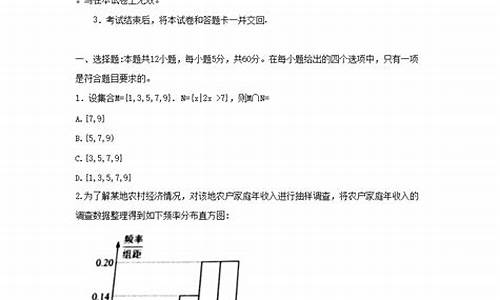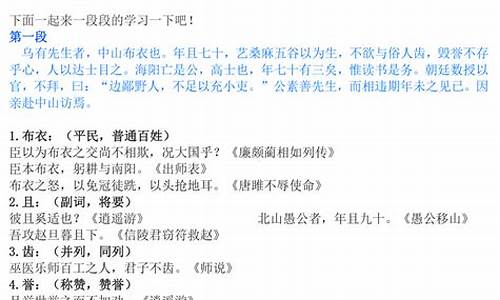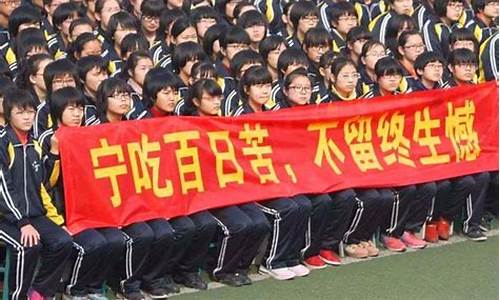2017高考答案贵州英语-2017年3月贵州高考听力答案
1.2011 2012 2013 2014 2015 2016 2017 2018年全国高考英语试卷真题及答案
2.2017年贵州高考英语错误相关人员怎么处理的
3.2017年贵州高考英语口语考试多少分及格
4.高考英语阅读理解训练
2011 2012 2013 2014 2015 2016 2017 2018年全国高考英语试卷真题及答案

2014-2018全国各地英语卷
百度网盘链接:s://pan.baidu/s/1LvpW-h0TwR-WqtUf7byHcw
?提取码:zh59
若有问题欢迎追问~
2017年贵州高考英语错误相关人员怎么处理的
贵州省九月份的高考英语听力考试出错,考卷有20道题但答题卡只有15个选项,考生只能将后5题选项手写在答题卡上。目前还没有出台具体处理意见。
贵州省高考英语听力考试每名考生有两次考试机会,分别在第三学年第一学期9月和第二学期3月,将以考生最高成绩记入高考英语科目成绩。
2017年贵州高考英语口语考试多少分及格
2017年贵州高考英语口语考试多少分及格取决于学校具体规定,以5分为满分计算,至少要3分以上。
高考英语口语考试由各省市自行组织,主要是为准备报考外语类院校及外语类相关专业的考生设置的一项测试。但准备报考其他院校及其他专业的考生也可以参加英语口试。
从2021年起,北京高考英语增加口语考试,口语加听力考试共计50分,总成绩分值不变。
考试模式:
高考英语口语考试目前有两种模式,即“对话”模式和“人机对话”模式。“对话”模式是一种传统考试模式,考官以面对面的形式与考生进行沟通,以判定考生英语口语表达能力。考官根据考生的语音语调、理解能力、表达能力、反应速度四个方面对考生成绩进行考核。
考官最后将这四项分数合计为总分。北京、安徽、河北、山东、辽宁等全国大部分地区的高考英语口语考试取了“对话”模式考试。
高考英语阅读理解训练
高考英语阅读理解精品训练2017
近几年高考英语阅读主要有猜测词义、理解主旨大意、推理判断、对文章的细节理解、 数据推算等几种题型。为了帮助大家备考高考英语阅读理解题,我分享了一些高考英语阅读理解练习,希望能对大家有所帮助!
阅读理解练习1
Not many years ago, a wealthy and rather strange old man named Johnson lived alone in a village in the south of England. He had made a lot of money in trading with foreign countries. When he was seventy?five, he ge ? 12,000 to the village school to buy land and equipment (设备) for a children?s playground.
As a result of his kindness, many people came to visit him. Among them was a newspaperman. During their talk, Johnson remarked that he was seventy-five and expected to live to be a hundred. The newspaperman asked him how he managed to be healthy at seventy?five. Johnson had a sense of humour (幽默). He liked whisky (威士忌酒) and drank some each day. ?I he an injection (注射) in my neck each evening.?he told the newspaperman, thinking of his evening glass of whisky.
The newspaperman did not understand what Johnson meant. In his newspaper he reported that Johnson was seventy?five and had a daily injection in his neck. Within a week Johnson received thousands of letters from all over Britain, asking him for the secret of his daily injection.
1. Johnson became a rich man through
A. doing business. B. making whisky. C. cheating. D. buying and selling land.
2. The gift of money to the school suggests that Johnson
A. had no children. B. was a strange man.
C. was very fond of children. D. wanted people to know how rich he was.
3. Many people wrote to Johnson to find out
A. what kind of whisky he had. B. how to live longer.
C. how to become wealthy. D. in which part of the neck to he an injection.
4. The newspaperman
A. should he reported what Johnson had told him.
B. shouldn?t he asked Johnson what injection he had.
C. was eager to live a long life.
D. should he found out what Johnson really meant.
5. When Johnson said he had an injection in his neck each evening, he really meant that
A. he liked drinking a glass of whisky in the evening.
B. he needed an injection in the neck.
C. a daily injection in the evening would make him sleep well.
D. there was something wrong with his neck.
阅读理解练习2?I?m very tired from working here,?said Jean to her friend Kate,? I?m on my feet from morning to night. For the first quarter of the day, I clean up the counter (柜台) and set the tables. For the next quarter, I help in the kitchen. For the second half of my workday, I take orders at the counters.?
?Kate, I wish I had your job,?Jean went on. ?For four hours you just sit at the cash register (收款台) taking in money.?
?But I spend two more hours in the kitchen (厨房) than you do,?said Kate. ?It?s tiring to cook over a hot stove. I don?t think you?d really want my job. In fact, I?d like your job.?
1. Both Jean and Kate probably work in a
A. hotel B. library C. lab D. shop
2. How long did they work every day?
A. eight hours B. twelve hours. C. Ten hours D. Nine hours
3. How long did Kate spend in the kitchen?
A. a quarter day. B. A half day. C. One-third day. D. Three-fourths day.
4. From this passage we can see that
A. they are both interested in their work. B. their work is neither tiring nor busy.
C. both of them are tired of their work. D. they?ve decided to give up their work.
5. Give a proper proverb (谚语) to Jean and Kate.
A. It?s never too late to learn.
B. It?s no use crying over spilt milk.
C. The grass is always greener on the other side.
D. One swallow(燕子) does not make a summer.
阅读理解练习3In 1985 a French television company sent its reporters to the Paris Metro. They took cameras to see what passengers would do if they saw someone attached on the platform or in the trains. They acted out incidents. The incidents looked real but they were all done with the help of actors. However, very few people tried to help, and most passengers pretended not to notice. in one incident, a foreigner was attacked by three men. The attack was on a train which was quite full, and although one man tried to get the passengers to help, they all refused. It seems that such behiour(行为) is not unusual, but the question is why? Is it a problem of big cities, or would the same thing hen anywhere? To discuss these questions, we he in the studio(演播室) Professor Wilson, who is an expert on the subject?
1. Who did the experiment?
A. A French television company. B. The Paris Metro.
C. The City Government of Paris. D. Professor Wilson.
2. What did the experiment try to find out?
A. How a foreigner was attacked on the train.
B. How passengers helped each other on the platform.
C. Passengers? reactions towards incidents.
D. Actors? performances during incidents.
3. What was the finding of the experiment?
A. Passengers helped a lot during incidents.
B. Very few foreigners were on the train.
C. Very few passengers tried to help during incidents.
D. Some people were good at acting on the train.
4. Who do the underlined words one man refer to?
A. One of the three men who attacked a foreigner.
B. One of the actors who took part in the experiment.
C. One of the passengers who were on the train.
D. One of the reporters who were sent to the Paris Metro.
参考答案:
1A 2 C 3 D 4 D 5 A
1A 2 A 3 B 4 C 5 C
1D 2 C 3 C 4 B
;声明:本站所有文章资源内容,如无特殊说明或标注,均为采集网络资源。如若本站内容侵犯了原著者的合法权益,可联系本站删除。












